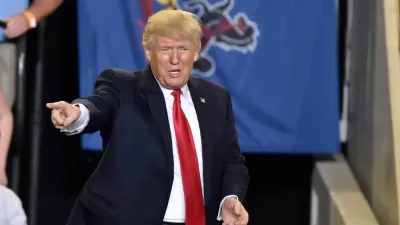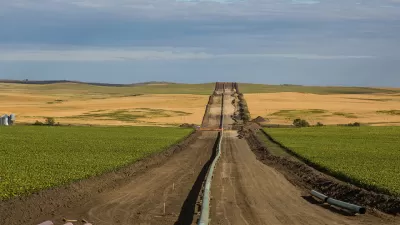Fulfilling two campaign promises, President Trump conditionally approved two controversial pipelines to transport oil sands from Alberta and Bakken oil from North Dakota, certain to stir opposition from environmentalists and Native Americans.

At a signing ceremony on Tuesday, President Trump reversed former President Obama's rejection of the controversial Keystone XL pipeline, though he "emphasized that the construction isn't a done deal, reported Gregory Korte, for USA TODAY. "It's something that subject to a renegotiation of terms by us," he said. "We'll see if we can get the pipeline built."
Similarly, Trump signed an action that revives the controversial Dakota Access Pipeline that was halted last month by the Army Corps of Engineers.
The "executive memorandum direct(s) the Army 'to review and approve in an expedited manner the pipeline, 'to the extent permitted by law and as warranted," report Peter Baker and Coral Davenport for The New York Times. "In his session with reporters, he added, 'Again, subject to terms and conditions to be negotiated by us.'”
Reaction from the environmental community is swift.
"Donald Trump has been in office for four days and he’s already proving to be the dangerous threat to our climate we feared he would be," stated Michael Brune, executive director of the Sierra Club. "But, these pipelines are far from being in the clear."
Two additional directives expedite the "process of approving and regulating future pipeline and infrastructure projects," adds Korte.
The first was about streamlining the permitting process and reducing the regulatory process "for domestic manufacturing," Trump said. It wasn't clear to this correspondent if this action was directed at pipeline construction or more broadly to other industrial activity..
If it’s a no, we'll give them a quick no, and if it’s a yes, it's like 'Let's start building,' " [Trump] said. "The regulatory process in this country has become a tangled up mess, and very unfair to people."
Donald Trump, environmentalist.
Anticipating criticism from the environmental community, he added (per New York Times):
“I am, to a large extent, an environmentalist, I believe in it. But it’s out of control and we’re going to make it a very short process. And we’re going to either give you your permits or we’re not going to give you your permits. But you’re going to know very quickly. And generally speaking we’re going to be giving you your permits.”
The second was about expediting environmental reviews and approvals for high-priority infrastructure projects," Trump said. Presumably this action was directed at the much anticipated $1 trillion infrastructure plan he has touted but about which he has offered few details.
A fifth action specified that pipes for domestic pipelines be constructed in the United States.
"The directives Trump signed Tuesday were a mix of executive orders and presidential memoranda," points out Korte.
As of press time, none were listed on the White House website.
FULL STORY: Trump signs five more orders on pipelines, steel and environment

Study: Maui’s Plan to Convert Vacation Rentals to Long-Term Housing Could Cause Nearly $1 Billion Economic Loss
The plan would reduce visitor accommodation by 25,% resulting in 1,900 jobs lost.

North Texas Transit Leaders Tout Benefits of TOD for Growing Region
At a summit focused on transit-oriented development, policymakers discussed how North Texas’ expanded light rail system can serve as a tool for economic growth.

Why Should We Subsidize Public Transportation?
Many public transit agencies face financial stress due to rising costs, declining fare revenue, and declining subsidies. Transit advocates must provide a strong business case for increasing public transit funding.

How to Make US Trains Faster
Changes to boarding platforms and a switch to electric trains could improve U.S. passenger rail service without the added cost of high-speed rail.

Columbia’s Revitalized ‘Loop’ Is a Hub for Local Entrepreneurs
A focus on small businesses is helping a commercial corridor in Columbia, Missouri thrive.

Invasive Insect Threatens Minnesota’s Ash Forests
The Emerald Ash Borer is a rapidly spreading invasive pest threatening Minnesota’s ash trees, and homeowners are encouraged to plant diverse replacement species, avoid moving ash firewood, and monitor for signs of infestation.
Urban Design for Planners 1: Software Tools
This six-course series explores essential urban design concepts using open source software and equips planners with the tools they need to participate fully in the urban design process.
Planning for Universal Design
Learn the tools for implementing Universal Design in planning regulations.
Ascent Environmental
Borough of Carlisle
Institute for Housing and Urban Development Studies (IHS)
City of Grandview
Harvard GSD Executive Education
Toledo-Lucas County Plan Commissions
Salt Lake City
NYU Wagner Graduate School of Public Service




























